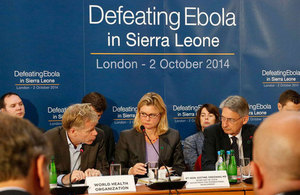Defeating Ebola conference in London: International community pledges more health workers, funding and supplies
Britain rallies international support to combat Ebola in Sierra Leone.

International Development Secretary and Foreign Secretary with representatives at the Defeating Ebola Conference in London. Picture: Jessica Lea/DFID
Britain has rallied decisive international support for Sierra Leone in its hour of need, International Development Secretary Justine Greening said following the Defeating Ebola conference today in London.
The conference, co-hosted by the Foreign Secretary and the International Development Secretary, brought together more than 20 governments, a dozen charities and NGOs, the UN, World Bank, health experts and the private sector to pledge funds, equipment and health workers.
The UK government has already committed £125 million to tackle the disease, this includes supporting 700 treatment beds to help up to 8,800 patients over 6 months as well as shoring up the country’s stretched public health services to help contain the disease.
Pledges have been received from across the world including Australia, Cuba, Canada and even the Philippines, which are still recovering from last year’s devastating Typhoon Haiyan. The Children’s Investment Fund Foundation, a leading charity, also pledged £12.4 million ($20 million) for the Ebola effort, £9.3 million ($15 million) of which will go to Sierra Leone.
Justine Greening said:
The international community gathering in London has made it clear it will take decisive steps to help Sierra Leone tackle this Ebola outbreak.
Representatives from more than 20 governments, a dozen NGOs, the UN and a number of multinational companies have pledged emergency medical facilities, health workers to provide care and training to local staff, funding, equipment and logistics.
The conference also heard from Sierra Leonean health minister Dr Abubakarr Fofanah, British nurse and Ebola survivor Will Pooley, and actor Idris Elba, who urged the world to get behind the people of Sierra Leone at this incredibly difficult time.
Mr Pooley, who contracted Ebola while working in Sierra Leone and recovered in the UK, spoke to the conference about his experience. Mr Elba took part in a session with representatives from the Sierra Leonean diaspora community alongside Ms Greening.
During the conference Ms Greening announced how Britain is taking further steps to reduce the spread of Ebola across Sierra Leone by undertaking rapid trials of community care units designed to isolate Ebola cases more quickly and highlighting the risk of infection during traditional burial rites.
The UK will set up a series of pilot Sierra Leone community care units to give people who suspect they might be suffering from the disease somewhere to seek swift and accurate diagnosis and appropriate care. Any individual with Ebola will be isolated immediately until they can be safely transferred to a full Ebola treatment centre. The pilot scheme will be evaluated for effectiveness before the UK considers a full roll out across the country.
Alongside this, the Department for International Development (DFID) will work with Sierra Leone’s Ministry of Health to help people reduce the risk of infection from the deceased. Traditional burials in West Africa can involve washing bodies and close skin to skin contact, meaning the disease can spread to friends and family members. With DFID support, charities on the ground will work with people to develop new rituals and other practices to honour their friends and relatives, while ensuring bodies are safely buried.
Current estimates suggest that the rate of infection stands at 1.7, meaning that for every 10 people who contract Ebola, 17 more will become infected. However, if infected people are isolated quickly after they contract the disease it is much less likely they will infect others in their families and communities. Early isolation of 70% of people infected will mean the infection rate will begin to fall and the numbers of people infected will eventually decline.
Defeating Ebola in Sierra Leone - Summary of conference pledges
General media queries (24 hours)
Email mediateam@dfid.gov.uk
Telephone 020 7023 0600
If you have an urgent media query, please email the DFID Media Team on mediateam@dfid.gov.uk in the first instance and we will respond as soon as possible.